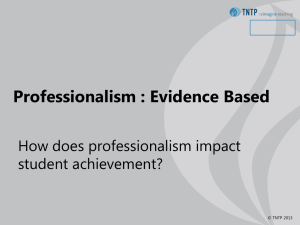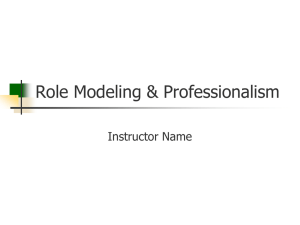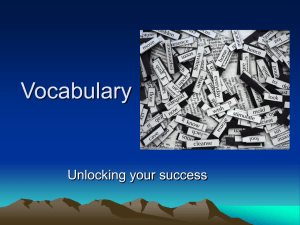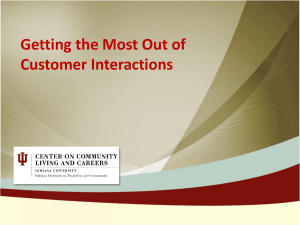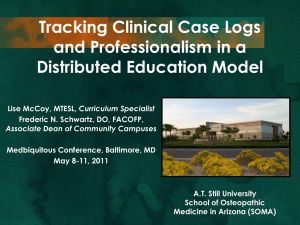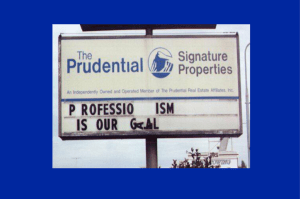Fostering a Culture of Accountability and Respect: Resident
advertisement
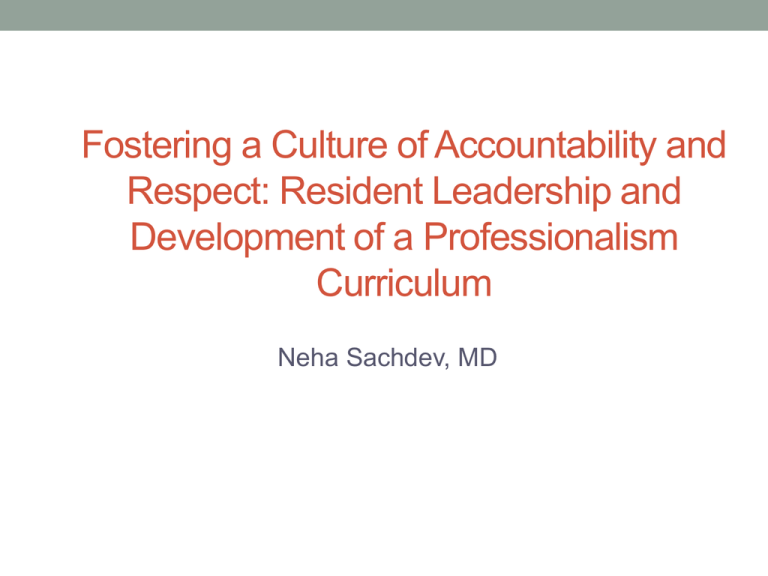
Fostering a Culture of Accountability and Respect: Resident Leadership and Development of a Professionalism Curriculum Neha Sachdev, MD Objectives Background II. Why Professionalism? III. Research Methods IV. Initial Results] V. Interventions VI. Timeline/Next Steps I. Background • Northwestern McGaw Family Medicine Residency • One of 11 original Teaching Health Center programs • Partnership with Erie Family Health Center (FQHC), Northwestern McGaw Medical Center and Norwegian American Hospital (America’s Essential Hospital) • Leadership Emphasis and Culture Why Study Professionalism? • ACGME Core Competency / Milestones • Central to formation of professional identity • Unprofessional conduct in learners strongly correlates with future disciplinary actions • Residents identify importance of professionalism education in training • Increasing demands on resident-time • Required for future leadership Research Methods • Outcomes Measures • Quantitative • Pre-post-post survey with PMEX • 24 residents, 6 fellows, 11 faculty members and residency coordinator • Qualitative • Small group interviews with R1 and R2 classes • Process Measures • Peer to peer formative feedback sessions • Longitudinal skill-building sessions • Longitudinal case-based sessions PMEX Survey • Validated tool • Specific, observable behaviors • 9 questions in 4 major categories • Doctor/Patient Skills • Time Management • Reflective Skills • Interpersonal Skills Assessment- PMEX Pre Results Characteristics: 21 Respondents-Faculty & Residents, response rate of 62% Lowest Professionalism Scores 5 4 3 2 1 Admits errors/ommissions Solicit feedback Accept feedback Address own gaps in knowledge and skills Highest Professionalism Scores 5 4 3 2 1 0 Shows respect for patients Maintains appropriate boundaries Use health resources appropriately Maintain patient confidentiality 9 Key Findings = Lowest mean scores in Reflective skills, Highest mean scores in Doctor-Patient Relationship skills Interventions • Peer to peer feedback sessions on inpatient service • CCC formalization with resident presence • Formal feedback trainingSBI method Timeline • Winter/Spring 2014 • First Post PMEX Assessment collected • Small group interviews with PGY1 and PGY2 residents • 6 professional skill-building sessions held with PGY2/PGY3 residents • Summer/Fall 2014 • First Post PMEX analysis • Formal feedback sessions implemented in clinic, MCH service • 3 ‘On Doctoring’ sessions held with all residents and faculty • 4 ‘On Doctoring’ sessions held with PGY2/3 residents • Winter 2015 • Second Post PMEX Assessment collected • Follow-up small group interviews with PGY2/PGY3 residents Focus Group Questions 1) We are interested in understanding how residents learn about professionalism. How would you define professionalism, what do you think it is? 2) We are interested in understanding your training and educational experiences in professionalism. Can you describe some of the ways that you have learned about professionalism? What has been the best educational experience? Why was this an effective method or approach? Can you describe some of the least effective ways to learn about professionalism? What made that educational experience ineffective? 3) What are some of the challenges to teaching professionalism in residency? What are your suggestions on how to teach professionalism effectively during residency? 4) Are there any other comments or experiences that you can share that would help us build an effective professionalism curriculum for residents? Focus Group Themes Identified Methods of Professionalism teaching/learning Definitions (positives and negatives) professionalism - Reflection - Respect - Didactic - Leadership - Case-based/situational - Patient care & - Role-modeling/mentors communication - Code of - Interprofessional conduct/standards relationships - Evaluations - Learned vs. innate (Individualized) - Self-assessment - Behavior under stress & fatigue Difficulties with teaching/identifyin g professionalism - Skepticism - Blurring of roles (peer vs friend vs colleague) - Time/scheduling Timeline/Next Steps • Winter/Spring 2014 • First Post PMEX Assessment collected • Small group interviews with PGY1 and PGY2 residents • 6 professional skill-building sessions held with PGY2/PGY3 residents • Summer/Fall 2014 • First Post PMEX analysis • Formal feedback sessions implemented in clinic, MCH service • 3 ‘On Doctoring’ sessions held with all residents and faculty • 4 ‘On Doctoring’ sessions held with PGY2/3 residents • Winter 2015 • Second Post Assessment collected • Follow-up small group interviews with PGY2/PGY3 residents “On-Doctoring” Curriculum • Defining Values • The Impaired Physician • Finding Inspiration in Medicine • Leadership and Communication • Risk Management and Legal Basics • Balance and Wellness • Lapses in Professional Conduct 16 References • Nasca TJ, Philibert I, Brigham T, Flynn TC. The next GME accreditation system--rationale • • • • • • • • and benefits. N Engl J Med. 2012 Mar 15;366(11):1051-6. doi: 10.1056/NEJMsr1200117. Epub 2012 Feb 22. ACGME Program Requirements for Graduate Medical Education in Family Medicine. ACGME, September 29, 2013. http://www.acgme.org/acgmeweb/tabid/132/ProgramandInstitutionalAccreditation/MedicalSp ecialties/FamilyMedicine.aspx, Accessed on February 2, 2014. Baldwin DC Jr, Daugherty SR, Rowley BD. Unethical and unprofessional conduct observed by residents during their first year of training. Acad Med. 1998 Nov;73(11):1195-200. Bahaziq W, Crosby E. Can J Anaesth. 2011 Nov;58(11):1039-50. doi: 10.1007/s12630-0119579-2. Epub 2011 Aug 25. Review. Barry D, Cyran E, Anderson RJ. Common issues in medical professionalism: room to grow. Am J Med. 2000 Feb;108(2):136-42. Gillespie C, Paik S, Ark T, Zabar S, Kalet A. J Grad Med Educ. 2009 Dec;1(2):208-15. doi: 10.4300/JGME-D-09-00018.1. Humphrey HJ, Smith K, Reddy S, Scott D, Madara JL, Arora VM. Promoting an environment of professionalism: the University of Chicago "Roadmap". Acad Med. 2007 Nov;82(11):1098107. Erratum in: Acad Med. 2008 Nov;83(11):1048. Cruess RL, Cruess SR. Teaching professionalism: general principles. Med Teach. 2006 May;28(3):205-8. Taylor C, Farver C, Stoller JK. Acad Med. 2011 Dec;86(12):1551-4. doi: 10.1097/ACM.0b013e318235aa76. Review. References • Gaiser RR. Anesth Analg. 2009 Mar;108(3):948-54. doi: 10.1213/ane.0b013e3181935ac1. • • • • • • • Review. Meade LB, Borden SH, McArdle P, Rosenblum MJ, Picchioni MS, Hinchey KT. From theory to actual practice: creation and application of milestones in an internal medicine residency program, 2004-2010. Med Teach. 2012;34(9):717-23. doi: 10.3109/0142159X.2012.689441. Epub 2012 May 30. Lee AG, Beaver HA, Boldt HC, Olson R, Oetting TA, Abramoff M, Carter K. Teaching and assessing professionalism in ophthalmology residency training programs. Surv Ophthalmol. 2007 May-Jun;52(3):300-14. Review. Swing SR. Assessing the ACGME general competencies: general considerations and assessment methods. Acad Emerg Med. 2002 Nov;9(11):1278-88. Regis T, Steiner MJ, Ford CA, Byerley JS. Professionalism expectations seen through the eyes of resident physicians and patient families. Pediatrics. 2011 Feb;127(2):317-24. doi: 10.1542/peds.2010-2472. Epub 2011 Jan 17. Roberts LW, Warner TD, Hammond KA, Geppert CM, Heinrich T. Becoming a good doctor: perceived need for ethics training focused on practical and professional development topics. Acad Psychiatry. 2005 Jul-Aug;29(3):301-9. 17. Ratanawongsa N, Bolen S, Howell E, Kern D, Sisson S, Larriviere D. Residents’ Perceptions of Professionalism in Training and Practice: Barriers, Promoters, and Duty Hour Requirements. J Gen Intern Med. 2006; 21:758–763. 18. Cruess R, McIlroy JH, Cruess S, Ginsburg S, Steinert Y. The Professionalism MiniEvaluation Exercise: A Preliminary Investigation.Acad Med. 2006 Oct; 81 (10): S74-S78.
